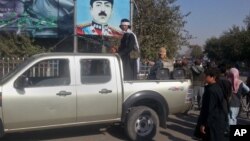Officials, civil society activists and politicians from Pakistan and Afghanistan are holding a two-day unofficial dialogue in Islamabad on how to lessen bilateral tensions, address misconceptions and build mutual confidence for jointly promoting peace and security on both sides of their shared border.
The unofficial interaction is taking place at a time of increased tension and mutual mistrust between Pakistan and Afghanistan.
Addressing the opening session Monday of the so-called "Beyond Boundaries” discussions, Afghan Ambassador to Pakistan Janan Mosazai emphasized the need for increased contacts to build mutual confidence.
“We believe that the civil society in Pakistan, the civil society in Afghanistan can become extremely substantial, extremely important stakeholders in the state-to-state and in the country-to-country cooperation and ties between Afghanistan and Pakistan,” said Mosazai.
Mosazai said Afghan President Ashraf Ghani took significant steps to improve relations with Pakistan after assuming office more than a year ago, and dismissed the impression the progress and contacts have completely halted.
“Unfortunately, where we seem to have failed the test of times is in translating our common vision, our points of convergence and our very specific decisions, when it comes to various dimensions of our relations, from words to actions,” said Mosazai.
Allegations fly
Afghan leaders allege the Pakistani military and its spy agency have not ended support for the Taliban insurgency, and Islamabad accuses Kabul of allowing anti-Pakistan militants to use Afghan soil for cross-border attacks.
Pakistani Trade Minister Khurram Dastgir Khan told the conference Islamabad is determined to prevent militants from using its territory for terrorist attacks. He hoped the two countries will overcome challenges to security cooperation in fighting terrorism.
“That is our aim to surmount in the coming days and months, but I want to emphasize this; that our commitment to achieve a shared peace, shared prosperity with Afghanistan, is stronger than it was a year ago. We want to go forward,” said Khan.
Omar's death creates void
The Afghan-Pakistan relationship hit new lows in July when it was revealed longtime Taliban chief Mullah Omar died more than two years ago. The disclosure disrupted a Pakistan-hosted peace dialogue between the Afghan government and the Taliban. Afghan leaders feel betrayed Islamabad kept the news of Omar’s death from them.
Since then, Mullah Akhtar Mansoor has become Taliban leader and the insurgents have widened their violent campaign in Afghanistan.
A Pakistani security analyst, Simbal Khan, attending the unofficial dialogue urged Islamabad not to respond to Afghan criticism by halting bilateral links.
"It should be understood by Pakistan that there are certain kind of realities the Ghani government is functioning under within Kabul, and they should not be too sensitive about what is said and what is not said and continue the process, continue to move it forward, continue the diplomacy,” said Khan.
Pakistani minister Khan emphasized the need for media outlets and journalists in both countries to tone down hostile rhetoric to allow the two governments to engage in constructive dialogue.




